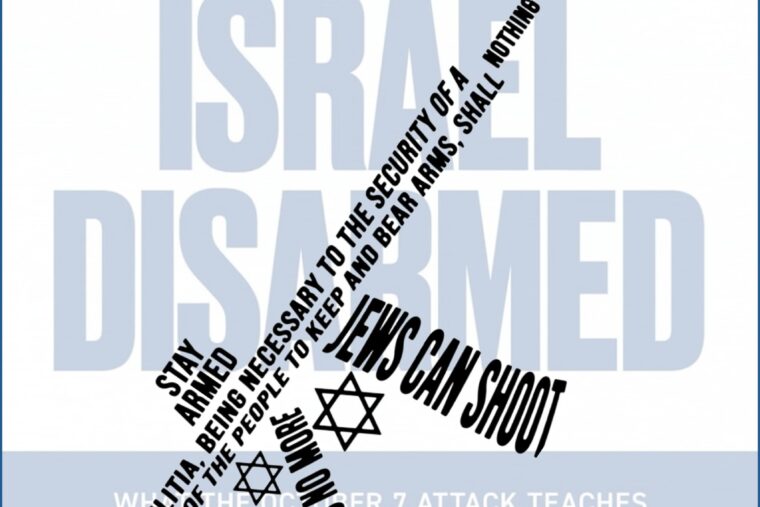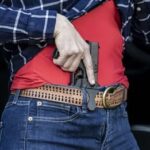October 7 and the Second Amendment: A Jewish American Lesson in Self-Defense
By Doris Wise, Founder and President, Jews Can Shoot
On October 7, 2023, Hamas launched a brutal attack on Israel, killing over 1,200 innocent civilians. This horrifying tragedy exposed the devastating consequences of civilian disarmament, a lesson that resonates deeply for Jewish Americans and all Americans who value self-defense. In his book Israel Disarmed: What the October 7 Attack Teaches Americans About the Right to Bear Arms, Mark W. Smith critically analyzes the attack, underscoring the critical need for citizens to preserve their right to self-defense, especially during crises when government response may be delayed.
While Israel’s approach to firearms is markedly different from the American model, especially in rejecting the American gun culture, the tragedy of October 7 forces us to confront uncomfortable truths about the limitations of relying solely on the state for protection. At Jews Can Shoot, we believe that the events of that day should serve as a clarion call for Jewish Americans to defend the Second Amendment—not just for the right to bear arms, but for the ability to protect ourselves and our families when those around us fail to act.
Israel’s Strict Gun Laws and October 7’s Toll
Israel’s gun laws are among the strictest in the world. Prior to October 7, only 1.5% of civilians were authorized to own firearms, leaving the majority of Israel’s population vulnerable in the face of an organized terrorist attack. With just 6.7 firearms per 100 citizens, Israel’s strict regulation left entire communities defenseless when Hamas terrorists stormed the southern towns and villages. One Israeli mother, whose home was attacked, posed a desperate question: “Where was the army? Where were the police? Where was the state?”
The delay in the government’s response was exacerbated by intelligence failures that had ignored warning signs about Hamas’s plans. In contrast, nearby kibbutzim with armed residents were able to repel attackers with far fewer casualties. This stark contrast serves as a reminder of the critical role civilian self-defense can play when government forces fail to act in time.
Following the attack, Israel made some limited adjustments to its gun policies, notably accelerating the approval of firearm permits. National Security Minister Itamar Ben-Gvir authorized the processing of up to 3,000 applications daily, up from 100 previously. However, this process remains selective, with a focus on individuals in high-risk areas or those with military training. While these changes signal some recognition of the importance of civilian defense, they reflect Israel’s continued commitment to strict control, which ultimately limits the rights of average citizens to arm themselves.
Israel’s Rejection of American Gun Culture
Unlike the United States, where the right to bear arms is enshrined in the Constitution, Israel’s relationship with firearms is grounded in a collective defense mentality shaped by constant security threats and mandatory military service. In Israel, guns are seen as tools of the state, not individual rights. This perspective has led many Israelis to reject the American gun culture, with its individualistic approach to firearms. As reported by The Wall Street Journal, many Israelis fear that American-style gun ownership could destabilize their society, and they see their highly trained military forces as sufficient for maintaining security.
Critics of even limited civilian arming, such as those cited in The Federalist, warn of risks like armed civilians being misidentified as terrorists, as happened in an incident following the October 7 attack. This reflects a broader Israeli consensus that widespread gun ownership is undesirable. Only those with military training or a specific need, such as living in high-risk areas, should be permitted to carry firearms.
As Jewish Americans, we respect Israel’s perspective on firearms, shaped by its unique history and security situation. However, our focus here is not to critique Israel’s policies but to highlight the broader lessons that can be drawn for American society, especially as we confront similar challenges in our own country.
A Historical Lesson: Disarmament’s Dangers
Mark W. Smith’s Israel Disarmed offers a sobering historical parallel that underscores the risks of civilian disarmament. In Nazi Germany, the 1938 Weapons Act stripped Jews of their ability to own firearms, rendering them defenseless as the Nazi regime escalated its persecution of the Jewish people. The consequences of disarming an entire population were catastrophic—an entire people were left vulnerable to violence and genocide.
While Israel’s gun laws were never intended to oppress, Smith argues that the limited access to firearms for civilians, particularly in the wake of the October 7 attack, left them exposed in ways that could have been avoided if civilians had more access to means of self-defense. This historical lesson is critical for Jewish Americans, who understand the devastating consequences of being left defenseless in the face of violence. The attack on Israel should serve as a stark reminder that when civilian access to firearms is restricted, societies become more vulnerable to attack and oppression.
The Second Amendment: A Jewish American Duty
The events of October 7 highlight why Jewish Americans must be vigilant in defending the Second Amendment. In his book, Smith critiques gun control advocates, including some Jewish organizations, argue that only “professionals” should be armed. These advocates ignore the historical and recent evidence that demonstrates the dangers of disarmament.
In the United States, the FBI has warned of rising terror risks and vulnerabilities at our borders. The Second Amendment guarantees that American citizens can defend themselves when government agencies or law enforcement agencies may not be able to respond quickly enough. As The Federalist notes, “The right to bear arms is about individual sovereignty, a principle Jewish Americans, with our history, should fiercely defend.”
A Persuasive Plea: Defend the Right, Not the Gun
The tragedy of October 7 teaches a universal truth: evil strikes without warning, and survival requires preparedness. While American gun culture may differ from Israel’s state-centric approach to firearms, both systems recognize the fundamental need for self-defense. In the U.S., the 400 million privately owned firearms reflect a deeply ingrained belief that citizens, not just governments, are responsible for securing their own freedom and safety.
While Israel’s post-October 7 efforts to expand civilian gun ownership are a step in the right direction, they remain insufficient in addressing the full scope of the threat. Jewish Americans, and all Americans, must recognize that the ability to defend ourselves is not just a political issue—it is a matter of survival.
At Jews Can Shoot, we call on Jewish Americans—and all citizens—to support the Second Amendment, even if they never intend to own a firearm. This is not about promoting a gun culture; it is about preserving the fundamental right to protect oneself when necessary. As the events of October 7 demonstrate, disarmament invites disaster. We cannot afford to be unprepared.
As Smith poignantly quotes George Santayana, “Those who cannot learn from history are doomed to repeat it.” The attack on Israel serves as a powerful warning that self-reliance is the only safeguard against the horrors of disarmament. Join us in defending this critical right. Visit JewsCanShoot.org to learn why the Second Amendment is not just a political issue—it is a Jewish and American necessity.
Doris Wise is the founder and president of Jews Can Shoot, a grassroots movement dedicated to empowering Jewish Americans through firearms education and self-defense training. A child of Holocaust survivors, she is committed to ensuring that “Never Again” is a promise backed by action, not just words.



